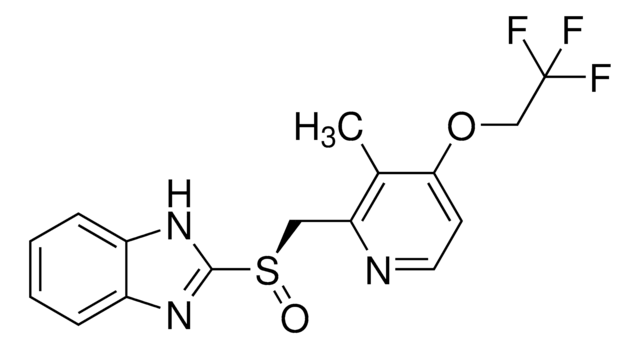Fontos dokumentumok
Y0000773
Lansoprazole
European Pharmacopoeia (EP) Reference Standard
About This Item
Javasolt termékek
grade
pharmaceutical primary standard
API-család
lansoprazole
gyártó/kereskedő neve
EDQM
alkalmazás(ok)
pharmaceutical (small molecule)
Formátum
neat
SMILES string
Cc1c(CS(=O)c2nc3ccccc3[nH]2)nccc1OCC(F)(F)F
InChI
1S/C16H14F3N3O2S/c1-10-13(20-7-6-14(10)24-9-16(17,18)19)8-25(23)15-21-11-4-2-3-5-12(11)22-15/h2-7H,8-9H2,1H3,(H,21,22)
Nemzetközi kémiai azonosító kulcs
MJIHNNLFOKEZEW-UHFFFAOYSA-N
Géninformáció
human ... ATP4A(495) , ATP4B(496)
Looking for similar products? Látogasson el ide Útmutató a termékösszehasonlításhoz
Általános leírás
Alkalmazás
Kiszerelés
Egyéb megjegyzések
kapcsolódó termék
Tárolási osztály kódja
11 - Combustible Solids
WGK
WGK 2
Lobbanási pont (F)
Not applicable
Lobbanási pont (C)
Not applicable
Válasszon a legfrissebb verziók közül:
Analitikai tanúsítványok (COA)
Sajnos jelenleg COA nem áll rendelkezésre ehhez a termékhez online.
Ha segítségre van szüksége, lépjen velünk kapcsolatba Vevőszolgálat
Már rendelkezik ezzel a termékkel?
Az Ön által nemrégiben megvásárolt termékekre vonatkozó dokumentumokat a Dokumentumtárban találja.
Tudóscsoportunk valamennyi kutatási területen rendelkezik tapasztalattal, beleértve az élettudományt, az anyagtudományt, a kémiai szintézist, a kromatográfiát, az analitikát és még sok más területet.
Lépjen kapcsolatba a szaktanácsadással


